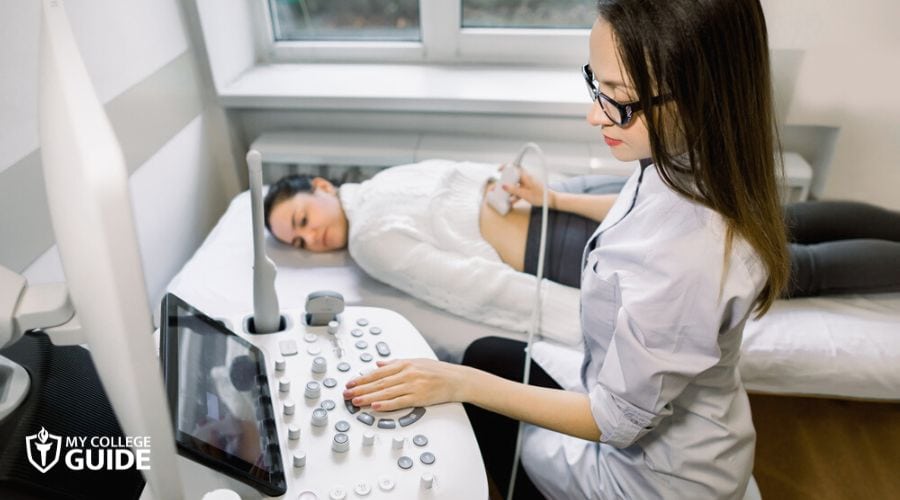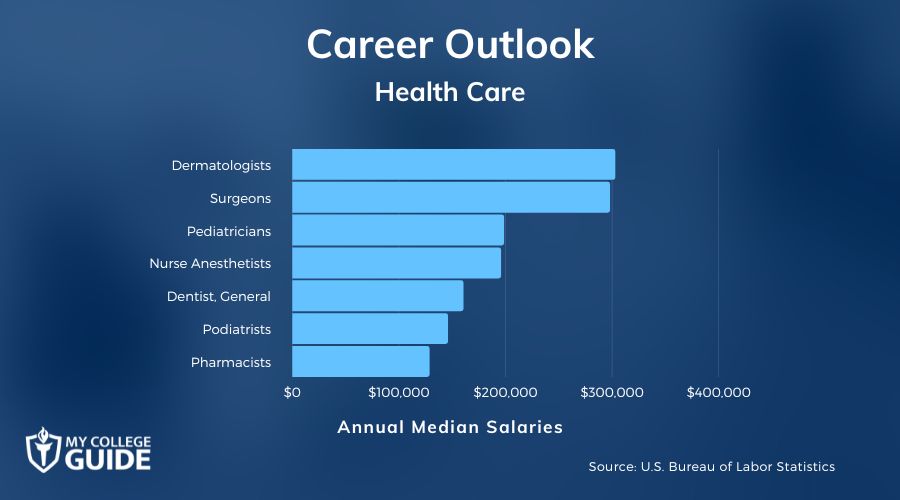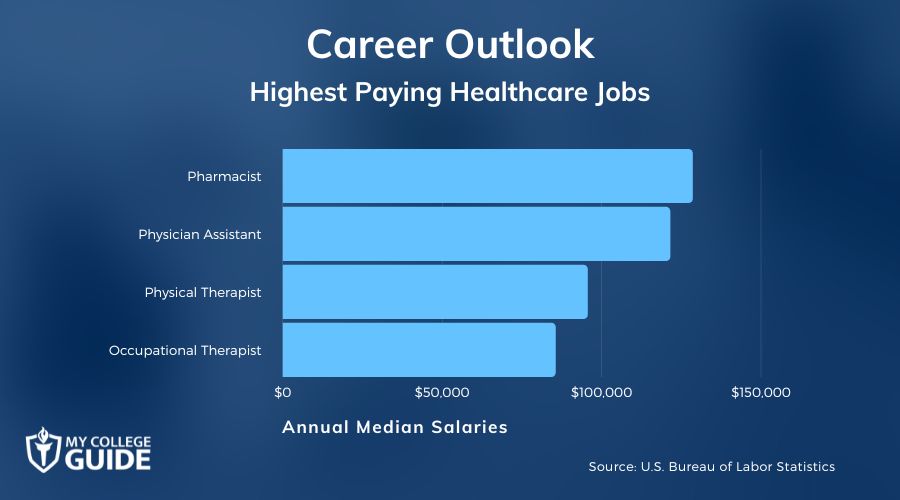If you are a compassionate person who wants to make a difference in a fast-paced profession, there are many great healthcare careers available to those with a degree in the medical profession.

Whether you want to work directly with patients or behind the scenes in a lab or office setting, a healthcare degree can provide you with the skills you need to succeed.
Editorial Listing ShortCode:
The healthcare industry is booming, and skilled medical professionals are always in high demand making it a good degree path with a lot of opportunities.
What Can You Do With a Healthcare Degree?

The medical field is extremely broad with a variety of careers in healthcare. From administration to research and direct patient care, healthcare job opportunities run the gamut in this rewarding field.
When deciding to pursue a degree in healthcare, it is important to have a good handle on your long-term career goals so you can choose a degree program that will adequately prepare you for your future line of work. Depending on where your passion lies, a healthcare degree can set you up to work directly with patients as a nurse, medical assistant, or physical therapist.
Editorial Listing ShortCode:
If you prefer a more behind-the-scenes approach to healthcare, you can opt for a career as an MRI technologist, diagnostic sonographer, medical records specialist, or even a health services manager. A healthcare degree opens the door to a lot of potential career paths depending on your skills and passion.
10 Things You Can Do with a Healthcare Degree
Those who are interested in a healthcare degree may be curious about professional opportunities following graduation.
Take a look at some of the different jobs in the medical field to help you understand what options may be available for those who choose a degree in healthcare according to the U.S. Bureau of Labor Statistics.
1. Administrative Services and Facilities Managers

Education Requirement: Bachelor’s Degree
Administrative services managers and facility managers can be found in a variety of fields, but are equally important in healthcare professions.
These individuals act as leaders to administrative, clerical, and reception office staff. They are responsible for record-keeping, issue resolution, staffing, and keeping the office running on a day-to-day basis.
2. Diagnostic Medical Sonographers

Education Requirement: Associate’s Degree
Diagnostic sonographers are part of the imaging technology team. When patients require digital imaging as part of the diagnostic process, medical sonographers and other imaging technicians are responsible for capturing these images.
Often, this includes preparing a patient for imaging scans, operating a variety of imaging equipment and software, as well as maintaining and cleaning this technology.
3. Medical Assistant

Education Requirement: Postsecondary nondegree award
Knowledgeable about both administrative and clinical tasks, medical assistants can be a very important part of the care team in a doctor’s office or hospital setting.
While medical assistants don’t often diagnose or provide treatment, depending on their educational requirements, they may assist in examinations, analyze test samples, patient education, and gather a patient’s medical history.
4. Clinical Laboratory Technician

Education Requirement: Bachelor’s degree
These lab techs work in medical laboratory settings, including hospitals, research facilities, and clinics. They collect and analyze a variety of medical specimens, including tissue, blood, and other fluids.
Using their knowledge of medical sciences, they are able to share their insights with a patient’s diagnostic team to help guide their treatment path based on their observations in the lab.
5. Physical Therapist

Education Requirement: Doctoral or professional degree
According to the Bureau of Labor Statistics, physical therapists are among some of the more rapidly growing healthcare professions.
Editorial Listing ShortCode:
These healthcare professionals work with treating physicians to implement a plan to help a patient’s body recover following an accident, injury, or illness. They frequently work at specialized rehabilitation centers or recovery homes, hospitals, or clinics.
6. Occupational Therapist

Education Requirement: Master’s degree
An occupational therapist is similar to a physical therapist in that they help patients recover from injuries, accidents, and medical conditions that may have caused temporary or permanent disabilities.
These professionals help patients learn how to perform various daily activities as necessary, working with the rest of the recovery team towards helping each patient regain independence.
7. Occupational Health and Safety Specialists and Technicians

Education Requirement: Bachelor’s degree
These professionals review job sites and work environments to gauge overall safety for the workers. They may recommend protective equipment and processes to minimize the potential for injury, as well as review equipment for ergonomic suitability.
Though any business can incorporate occupational health and safety specialists, this role is frequently in demand at construction sites or factory settings.
8. Dietitian

Education Requirement: Bachelor’s degree
These professionals work with clients to help them engage in healthy eating habits. Whether the client is working towards a health goal or has been recently diagnosed with a condition that requires diet changes, a dietitian can help them understand nutritional facts and choices.
Dietitians may work as independent consultants or within a hospital or clinical setting.
9. Forensic Science Technician

Education Requirement: Bachelor’s degree
Forensic science technicians frequently participate in criminal investigations alongside law enforcement. Their role may include gathering, cataloging, and storing specimen samples, as well as analyzing and reporting on their findings.
They may also work in crime scene recreation, and work with law enforcement and attorneys to present their analysis of evidence in court.
10. Health Services Manager

Education Requirement: Bachelor’s degree
Health services managers work within a specific healthcare office, clinic, hospital, or care facility, to create goals, policies, procedures, and other practices to help provide patients with the best possible experience.
Editorial Listing ShortCode:
These professionals are often tasked with creating budgets and schedules, as well as coordinating and reviewing resources and suppliers in an effort to maintain efficiency and high quality of care. Health careers aren’t strictly limited to the roles of a doctor or nurse. There are many healthcare professions that focus on laboratory, administrative, and leadership skills.
Health Care Careers & Salaries

There are many medical field careers available to those who graduate with a healthcare degree.
To give you an idea of the different types of medical field jobs you can pursue after you have earned your degree, we have put together a list of the top 40 healthcare careers & salaries according to data from the U.S. Bureau of Labor Statistics (BLS).
| Careers | Annual Median Salaries |
| Dermatologists | $302,740 |
| Surgeons | $297,800 |
| Pediatricians | $198,420 |
| Nurse Anesthetists | $195,610 |
| Dentist, General | $160,370 |
| Podiatrists | $145,840 |
| Pharmacists | $128,570 |
| Optometrists | $124,300 |
| Health Care Managers | $101,340 |
| Physical Therapists | $95,620 |
| Occupational Therapists | $85,570 |
| Radiation Therapists | $82,790 |
| Cardiovascular Technologists | $80,150 |
| Genetic Counselors, Hospitals | $79,810 |
| Audiologists | $78,950 |
| Dental Hygienists | $77,810 |
| Diagnostic Medical Sonographers | $77,740 |
| Orthotists | $75,440 |
| Chiropractors | $75,000 |
| Respiratory Therapists | $61,830 |
| Occupational Therapy Assistants | $61,730 |
| Dietitians | $61,650 |
| Occupational Therapy Assistants and Aides | $61,520 |
| Public Health Specialists | $60,600 |
| Clinical Laboratory Technologists and Technicians | $57,800 |
| Recreational Therapists, Hospitals | $50,970 |
| Surgical Assistants and Technologists | $48,510 |
| Athletic Trainers | $48,420 |
| Licensed Vocational Nurses | $48,070 |
| Exercise Physiologists | $47,940 |
| Paramedics | $46,770 |
| Medical Records Specialists | $46,660 |
| Dental Assistants | $38,660 |
| Phlebotomists | $37,380 |
| Medical Assistants | $37,190 |
| Pharmacy Technicians | $36,740 |
| Emergency Medical Technicians (EMT) | $35,470 |
| Occupational Therapy Aides | $33,560 |
| Nursing Assistants and Orderlies | $30,290 |
| Home Health and Personal Care Aides | $29,430 |
The continuous development of specialized medical advances along with an aging population makes the healthcare career outlook very positive. Since a healthcare degree covers an expansive range of career opportunities, it is useful to look at the projected growth in your chosen career ideas.
The BLS predicts that over the next 10 years, careers in medical and health services managers will grow 13%, which is significantly higher than the national average across all occupations, such as graphic design careers or careers in history, for example.
Editorial Listing ShortCode:
Additionally, the career paths of paramedics and pharmacy technicians are projected to grow by 6% and 5% respectively. While certificate and associate degrees pay substantially less than high-level graduate degrees, you may make more or less than the numbers listed above based on your education, skills, and experience.
With the potential to earn above-average salaries and continual expansion in the job market, pursuing a degree in healthcare is an excellent choice for a challenging and rewarding career path.
How to Know if a Career in Healthcare is Right for Me

One important thing to keep in mind is that different careers in the medical field will require different skills. For example, a medical assistant and an occupational safety technician will have different educational backgrounds, despite both being healthcare professionals.
There are several areas in which health careers overlap. For example,
- Clear communication is necessary for all health professionals to educate and inform others.
- Many jobs in healthcare involve a background in science, including biology, chemistry, and anatomy.
- Stress is a common factor among many healthcare professions, whether dealing with emergency situations or ensuring the safety of others.
- Higher education, certification, and licensing are required for many jobs in healthcare, which can include sitting for examinations in addition to earning a healthcare degree.
When determining if a healthcare career is right for you, take a moment to evaluate the steps professionals take and the skills they develop in order to make their goals a reality.
Is Financial Aid Available?

Students who are interested in financial assistance may have several options to explore. Those looking for need-based Federal financial aid may start the process by completing the Free Application for Federal Student Aid (FAFSA).
Many schools also offer scholarships or grants to those who are pursuing their health care degree. You may wish to contact the Admissions department to determine what options are available to offset the cost of tuition. Additionally, private scholarships are often provided by professional associations. Your employer may also offer tuition reimbursement or educational assistance.
What is a Healthcare Degree?

A healthcare degree is a degree program that prepares you for handling administration work and caring directly for patients in a medical setting. Your exact course selection during your educational journey will vary based on the specific degree program that you choose.
For example, both on-campus and online healthcare administration degrees will focus heavily on computer and literacy skills while the path to becoming a paramedic will be largely skills training. While some students apply for entry-level jobs straight out of an associate’s or bachelor’s program, there are many advanced educational paths within healthcare that can lead to well-paying, high-level careers.
Editorial Listing ShortCode:
It’s important to remember that online healthcare degree programs vary significantly to focus on the needed skills for your future career, but there are some commonalities between them.
Across the various concentrations, you may come across these common course themes in your studies:
- Global Health Concerns
- Medical Laws, Policies, and Ethics
- Healthcare Theories and Strategic Planning
- Leadership and Management
- Healthcare Organization Informatics
Many healthcare degrees require at least some level of on-site learning to master the skills needed for the workplace. However, there are several reputable colleges that offer online healthcare degree programs for certain concentrations to provide you with the flexibility you need to juggle work, school, and family obligations!
What Are the Highest Paying Healthcare Jobs?

These are considered some of the highest-paying jobs in the healthcare industry, with median salary information provided by the Bureau of Labor Statistics.
Bear in mind that experience, location, and other factors may impact the salary range offered to you as a new graduate.
- Pharmacist – $128,570
- Physician Assistant – $121,530
- Physical Therapist – $95,620
- Occupational Therapist – $85,570
While different careers in the medical field may be more lucrative than others, bear in mind that additional education may also be required.
Is a Healthcare Degree Worth It?

Yes, a healthcare degree is worth it for many professionals. This educational path can be an excellent starting path for a variety of careers.
According to the BLS, many careers within the health field, including physician assistants, medical assistants, and occupational therapists, are growing at a faster-than-average rate. For example, are expected to see a 16% growth rate over the next decade.
Editorial Listing ShortCode:
Careers in healthcare have the potential to impact every human being, regardless of whether you work directly or indirectly with patients. As a result, jobs in this industry will continue to be important for supporting the health of our global population.
Getting Your Healthcare Degree Online

There are a wide variety of career options in healthcare, but the first step for all of them is to get your healthcare degree online.
Earning your degree will help prepare you for your professional goals by giving you the skills and knowledge these careers require. Not everyone who works in healthcare is a doctor or nurse, though those are certainly career paths that many students pursue. Healthcare professionals work in a variety of settings, including laboratories, offices, and even construction sites.
Take a look at some of the programs offered to determine which one best suits your goals as a healthcare professional.
